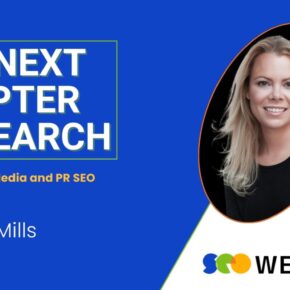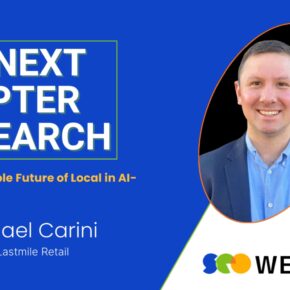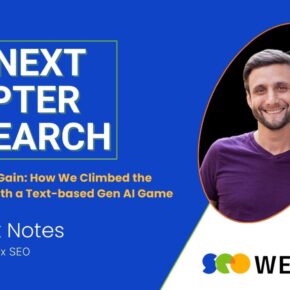
About Dan Petrovic
Dan Petrovic is the managing director of DEJAN and a well-known name in the field of search engine optimisation. Dan is a machine learning specialist and a highly regarded search industry event speaker.
Dan's SEO Week Session
- Title: Beyond Rank Tracking: Analyzing Brand Perceptions Through Language Model Association Networks
- When to Watch: Day 4 | Thursday May 1st | 10:45 am
- Session Abstract:
Rank tracking is outdated. Search engines don’t just rank pages anymore—they build complex maps of how brands and concepts connect. Dan Petrovic will show you how to tap into the same technology Google uses to understand brand positioning in a way that traditional SEO tools can’t.
- Why rankings alone don’t tell the full story of your brand’s visibility
- How to use language models to uncover hidden brand associations
- A step-by-step look at the DEJAN methodology for mapping brand perception
Transcript
Garrett: Okay, hey everybody, welcome to The Next Chapter of Search presented by SEO Week and iPullRank. Today I am joined by Dan Petrovich, who is the managing director at Dijon. And I’m going to talk to him a little bit about the world of SEO. Dan, thanks for joining me today. How you doing, man?
Dan: I’m doing very well, thank you.
Garrett: Okay, let’s dive right in. State of SEO, there’s a lot in flux over the last few years. Can you share your perspective on the current state of SEO? Where are we at?
Dan: Well, currently we’re looking at a very activated Google, who’s realized that they’ve got competition. So, we’re looking at early days of them very rapidly improving the quality of search and adding a ton of new features that will be awesome to see in the next two years. I’ve made a prediction on Twitter. I said “watch this space, Google’s activated, they’re about to do amazing things. If it doesn’t happen within two years, you come back to this tweet and call me out.” You know, I’m fine with being accountable for it. So that’s Google. Definitely amazing things will come out of their engineering teams now that they’re allowed to do amazing things again. So that’s great.
Amazing things will come out of SEO as well because we’ve been enabled with a phenomenal amount of technology and tools to support our workflows. So, everyone who has an appetite for innovation and building things and streamlining things can do that now. And that puts us in an interesting position where the expected output from a typical SEO is a lot higher. And I don’t know if that’s a good or bad thing, but our clients will expect more and more from us and a higher level of work. Which is fine with me. I’m comfortable with what’s going on. Spent the last two years or 2+ years studying machine learning all across and couldn’t be more excited about SEO. From just a bit of background, around 2013 when my daughter was born, I went into kind of a semi-retirement, because SEO was boring. Same old things. Right? Technical SEO, keyword research, competitive research, a bit of link building content, schema local SEO. So now things are really fun and I do these crazy, you know, 14-, 15-hour days. Just feel like it’s, I feel like it’s 2006 again. It’s fantastic.
Garrett: I love that. You are a tinkerer, a builder, an experimenter, and it kind of leads right into this next phase of search, which is conversational search. The way that people are interacting and actually searching on ChatGPT. For your presentation at SEO Week, you are really going to tackle this next phase, which is how do you monitor brand representation in LLMs. Can you kind of give me a summary of what people would get excited about from what you plan to share with us?
Dan: Yeah. Well, I’ve been planning to implement this for the last six months. The idea popped up quite organically within our teams. Like, okay, so AI overview started and then, you know, people are discovering. And at the time we thought, you know, ChatGPT is for geeks and, but now we’re seeing it integrated, you know, Gemini is integrated in Android. Apple’s got the deal with open AI. Things are happening. Perplexity is big. And it’s quite obvious that yes, there’s Google, but people are discovering brands, products, services, learning about new things and concepts and people. If your brand or name is constantly mentioned in the context of something, you will become an authority. It’s like a self-perpetuating prophecy, but you will become an authority in that. It’s a huge thing for somebody to be promoted in AI answers.
So, there’s two levels. One is the core memory, the knowledge, the neural network just spits out your brand or your name as an answer because it’s innate. It’s inbuilt coming from the training data. And there’s a various levels of fine tuning, knowledge updates, retrieval, augmented generation, basically using external data sources to feed the large language model to give those results. My job right now is to study all that, analyze what works, what doesn’t work. And I feel like there’s a lot of things to do right now. And we might, you know, in five years time, we might not be able to influence these things as easily. But right now, fertile ground for manipulation, for hacking, for tweaking. So it feels so, you know, 2005, 2006. And I think now is the time to do that stuff.
But you know, influencing is one part, of course, measuring is another. So we need to understand when somebody types in a query or a product or service, you know, we want to understand how frequently does a brand or product or a name come up in those answers. And the issue is that there’s so many models right now. And how do you get a balanced overview of what’s going on? Luckily, we have this mentality of rank tracking. So we kind of, you know, we know how that works. You know, you’ve got a query and then you have the rank tracker up and down. And so, for each query or a concept, you can have the representation percentage and have that sort of like, you know, the track of ups and downs, which we see in the rank trackers.
So, I’m hoping to have that and I’m hoping to have a score that I can give to a single score that I can give to my clients in the report that says “your representation, overall representation score is 38%. Last month, it was 35%. We’re doing well. We’re going up.” It’s a little bit of a dumbed down factor, but I think people like a single score, a single metric, DAPA, PageRank, this, that. And I think it’s going to catch on if I’m, you know, persistent with it enough.
Obviously tracking is a technical challenge. So, we’ll need to use some trickery. Obviously we can’t tap into actual queries of people in their chats. So we’ll have to use, you know, things like synthetic data and querying of the models. You know, you know, those when, in China, they have those swipe phone farms and you just do like a lot of interactions on TikTok and you know, this and that. I might have something of that type without an actual physical form. I might have like a couple of hundred instances of something querying models all the time. For all the, maybe even something on API from, from a search console, querying top 5% of all the most important queries for my clients. And then monitoring those automatically without too much manual setup. So scaling up, understanding of representation, is what I’m busy with right now. I doubt that I will have this as a problem solved by April. But I will, I will have surely some really solid frameworks and prototypes ready to share and excite people with.
Garrett: That’s so cool. And to your point, it’s like people want that, that share voice, that market share perspective for as consumer search behavior changes and they use these tools for search. Executive need, you know, major clients, businesses need a way to report on that and ways to show up. What is a tactic that someone, you know, whether you are an enterprise or a small business right now could use to, in this like ecosystem of chatbots and LLMs, to improve visibility or monitor visibility?
Dan: So if you ask that, you know, a regular Joe, they’ll say, you know, do digital PR, generate buzz around your brand. And that’s, that’s a fair answer. You know, I’ll say, I’ll, I’ll jump on the bandwagon and I’ll say the same thing. Obviously if there’s a lot of chat about your brand discussions and you’re in the news and notability, you will surely pop up. But, you know, I, like I mentioned earlier, this is the hacker days, manipulated days, you know, like, so I’m going to say one thing, getting to training data, getting to training data.
How do you do that? That’s why I need to catch up on all this geekery and jargon that we use in machine learning space. What’s hugging, what’s hugging face? What’s data sets, training data sets. What are the training data sets for? Well, you use training data sets that are free and open source, and I can generate a training data set synthetically using a model like Gemma. In fact, I have one that’s maybe a hundred megabytes already big because I just go on holidays and my computers are churning training data, just generating synthetic training data. So, I upload that to hugging face or other, you know, Kaggle and other platforms. And what do you know? My client seems to be represented a little bit more than just a little bit in there. And my training data is saying good things about them, not necessarily good things, but like associating my client’s brand name with the things that they do and the things that we want.
So I doubt that OpenAI will pick up that data set and train their models on it, but the little models will. And then, one thing like, you know, they get amalgamated and merged and joined and they make models and distilled. So you always find value in that. And I don’t know, it’s not to say that they wouldn’t, but I’m saying give it every chance to get in there. So for example, DeepSeek wasn’t trained on like the billion dollar budget. They would have used small data sets from Hugging Face for sure, guaranteed, to generate, you know, and structure their own reinforcement learning data sets and everything else. So if you happen to be, now that ship has sailed, DeepSeek’s out, but you know, any future little innovations like that, you could, you know, get jackpot and end up in the training of that model and be the foundational element of it. That’s, I think, pretty exciting. So that’s the kind of stuff that I do and think about these days while things are still quite in development, that we can influence it early on.
Garrett: I love that. And so much of this is like, you know, getting visibility in the near future, but also thinking the far future, like what is the big question? What’s the next chapter of search? What does search look like to you? What’s the next iteration? Whether it’s Google or just any search behavior?
Dan: Well, the next logical step is my agent will talk to your agent and they’ll figure things out. So, I think in a sense, search will be, it will be as important to influence the robots as it will be important to influence humans these days.
So how do you influence somebody’s, I mean, in Australia, we don’t have operator yet. It’s only limited to the US. And I think those who are paying $200 a month for the premium subscription. But that’s early days of…I think this is very hacky at the moment, like the operator or the agent is just going clicking on things randomly, missing buttons and making little mistakes. That’s all nice and cute right now. But soon enough, I think we’re going to see the true value of structured data and good solid foundation websites and good SEO. When one website is just, an agent can go through it and figure things out and the taxonomy is clear and there’s product schema on it and everything is great and then you’ve got this hot mess of a website that nobody knows what’s going on and the breadcrumbs are different from taxonomy and there’s no, actually there’s no taxonomy and the product naming conventions are different.
So you’ve got a non-SEO website and you’ve got an SEO website. So SEO hygiene now becomes influence for robots. And I think that’s pretty exciting, because we just went full circle. We went from hacking Google to focus what’s best for the user and now we’re back to it. Now with influencing robots again. Although we just call them, what do we call them? Agents or operators or whatever. So I think that’s the next chapter in SEO being influencing the machines. I find that pretty exciting.
Of course, we still have the bread and butter of what we do is still human work, because ultimately what the agent brings to the human will be the deciding factor to how they act on that information. I think the days of people sending an agent to buy somebody an item and then come back, I think that’s a little bit too far off for now. I think it’ll be more like, okay, go find me the best options and then people make the final judgment. And the final judgment will be made on the product quality, product image quality and the description and everything that comes with that. The quality of information that’s assembled and brought to you as a user is only as good as what you put into it. So there’s a lot of value for us as an industry to contribute to the web ecosystem.
Garrett: There you go. There’s a lot to process. Thank you so much. It’s such fascinating stuff. Like we geek out over this stuff because like you said, it is one of the most exciting times in search and machine learning and the development of this tech. For any of you who want to check out Dan and see this killer presentation that you know he is concocting in his mad science laboratory down under, make sure that you sign up for SEO Week, which is the last week of April the 28th to May 2nd in New York City. This has been The Next Chapter of Search. My name is Garrett Sussman produced by SEO Week and iPullRank. Thanks Dan for joining us. This has been awesome.
Dan: See you soon.



